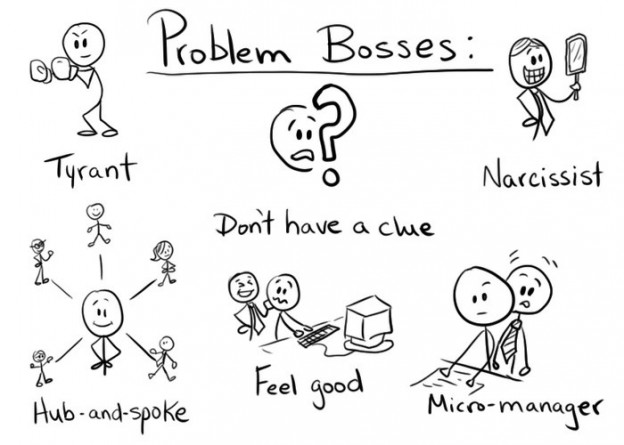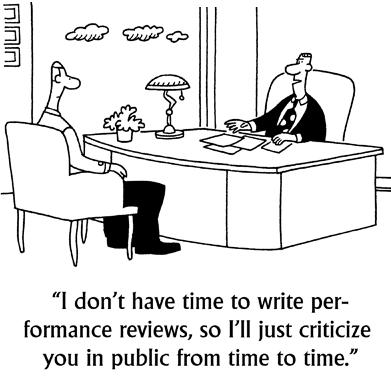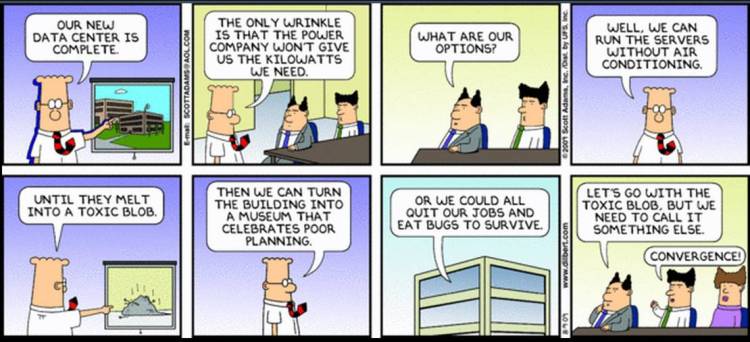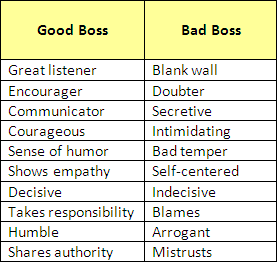I don’t know about you but during my 20 years working in a variety of office based environments, the one thing that struck me almost since the first day was that by and large, the majority of managers are to a certain extent unsuitable.
In my time so far I have had 11 managers and it is far to say that aside from one or two who have been amazing, others who have been good, most of them have been useless, incompetent, disorganised, bullying, vindictive, jealous or otherwise ineffective. I say this as someone who has also been a manager myself.

It seems to me that very rarely are the correct decisions taken in the management of staff at work or in the promotions of people into more senior roles. Time after time I saw people who no matter whether good or bad were pretty ineffectual in their position but because they shared a unique connection with a key decision maker they got promoted. This could be smoking, sports, strip clubs or just the ability to talk absolute nonsense for day after day but it is the type of nonsense someone wants to hear even though everyone else in ear-shot knows that in effect they are talking out of their posterior.
Many managers where I have worked have verged on the incompetent. Unable to do anything meaningful themselves and often unable to organise themselves, they require huge assistance to do even the slightest thing whether printing something out, doing their work for them, getting them out of emergencies because they forgot something you told them repeatedly over the day or days until it is too late or even being asked how to spell common words. On one occasion a director even argued with me on how to spell the word ‘no’.

I am not entirely sure why this happens, it could just be that some people who are very good at doing the work and don’t protest or complain get left behind or taken advantage of. Some people just come to work to do work, they are 100% reliable and don’t want to join in the office politics or be high-flying or tell anyone who knows better than they ever will, how to do their job. With very few exceptions, it does seem that the more senior someone is, the more they are lacking even the basic skills to get on in life.
Not every manager though can be there by the old-boys network or magic and some have hypothesised that a quasi-scientific principle can be used to demonstrate how this happens. It is called The Peter Principle which states “in a hierarchy every employee tends to rise to his level of incompetence.”
For example, you’re a salesman. Your trade is the gift of the gab and you start off doing quite well until you become a team leader and then if all goes well to a manager or director. You have no interest or skill in managing people but it is the reward for your talents as a Salesman. You sit there day after day, totally ineffectual and inadequate because you are in a position that you are wholly unsuited to. Meanwhile your actual skills or ability both goes to waste and eventually disappears through lack of use or a changing world and you can do is plan high-level meetings, balance budgets and try to keep staff motivated who know full well that you are worse at your job than they are at theirs and yet you get paid often many times their salary.
Related to the older Peter Principle and one that is now more famous is that of the Dilbert Principle. Dilbert for those who don’t know is a long suffering, highly sarcastic and overlooked body in an I.T Department. Roughly put the Dilbert Principle states that “companies tend to systematically promote their least-competent employees to management (generally middle management), in order to limit the amount of damage they are capable of doing.”
I have worked in one or two places where the Dilbert Principle has clearly been applied. Certain people cost the company more money when they sold an order. Everyone was less stressed and usually the company financially better off if they were out of sight and out of mind. When that person won an order, largely down to the brilliance of engineers and administrative teams, the whole company would fear what would happen next and there was a mix of feelings of elation by those who had worked on the project that with the sale done, his attention would go elsewhere for a few weeks and unhappiness because someone so untalented could get all the prestige and bonuses compared to the browbeaten staff who had done the main work on it.
One day I even saw one manager spend 7 hours just pushing a pencil across the desk, bored beyond belief and yet promoted out-of-the-way where he could do minimum damage.
So many times, customers or potential customer would approach the non-management team and say how much they would like you and your hard work and even some products or solutions but they would hate certain incompetent individuals.

The Dilbert principle really believes that the people who do all the hard work are near the bottom of any organisation. The senior positions are by and large the home of the incompetent, where they have limited ability to reduce the profitability and stability of day-to-day functions. A great example of the Dilbert Principle is the film Office Space where a hard-working person decides the best way to get promoted is by acting a jerk and doing very little while the hardest working person ends up working on his own in the dark without even a stapler to call his own.
Why this situation exists, it is hard to know. By and large, people who start and run their own business are both hardworking enough to get the job done and know how to do that high-flying stuff but there are very few of these types of people as most hard workers just want to work and most of the management are unable to do the work necessary to become important in their own right by starting a business.
Some of these problems could be solved by actually not promoting talented people at all. By all means and by that I am being polite…. the hardworking people who have obvious talent should perhaps be kept on in their original positions but their pay increased to management levels. If they are no good, they shouldn’t be there and definitely shouldn’t be promoted due to friends, money or to get them out-of-the-way.
Not every manager or director I have met has been bad but the majority have been or were so young that they hadn’t yet reached their levels of incompetence. Even when you have a good boss, they are usually outnumbered in the company and forced to implement stupid ideas or even worse, slowly mutate into a bad boss. Too often though it has been the total reverse, a life of meetings, paid for lunches and hotels and quite a lot of fun whilst the majority have suffered. Most bad bosses don’t seem to realise they can accomplish a lot more my being a good boss. Staff will work harder, will feel empowered to help the company and have faith in themselves, their boss and the company. Bad bosses though often just don’t care and treat staff like scum and insist everyone else is the problem because of course that one person is always better than the often more experienced, cleverer and just better person than they are. At least 4 of my bosses have been bullies, some quite severe that act in a way that would be highly illegal out of work and probably are illegal anyway. At least one bad boss who wasn’t directly mine went to jail for none-bullying reasons. Two or three bosses were brilliant, everyone knew they were brilliant and were battling against the tide of a bad company or bad management in general and I’m still friends with these people long after working with them. Mostly I and others just wondered how on earth could someone so useless get paid so much to do so little. Of course, we could do little too if only they didn’t continually either mess things up or make the wrong decisions.
Some common signs you have a bad boss include:
-Taking Credit for your work
-Making reference to your salary or bonus in front of others
-Shouting or disciplining you in front of colleagues.
-Bullying or intimidation
-Consistently being given tasks with unreasonable expectations
-Shares personal details in the office
-Consistently over a long period of time makes petty remarks about your work, lack of dedication, time-keeping, office demeanour. If something is bad, you should be disciplined according to your company regulations. If you’re subjected to a daily barrage of petty remarks it is not you, your boss is a bully.
-Treating you differently because of your age, sex, race, nationality, religion or appearance and claiming any is a factor in your work performance

Stephen, read this post with interest. My own writing career started because of the many tales I had bottled up inside working in large corporations for over 20 years. Early posts on this blog, and my first book, are all satires on the strange behaviour of people in corporations. Many of them bosses, but some lower level employees as well. “Dilbert in prose” is how I like to look at these pieces, though, of course, I flatter myself with the comparison to Scott Adams.
LikeLike
Hello Ankur, I actually thought of you when I started writing this earlier today as I remembered that you were interested in this area.
Scott Adams is something of a genius but I am going to take the time and look at some of your early blog entries as I am sure I will enjoy them.
Thanks for commenting!
LikeLike
Reblogged this on ThePoliticalIdealist.com.
LikeLike
This is so depressingly true. It fits with my own experiences of bad managers over the years. I have constantly suffered bosses who took credit for my work, and who constantly gave me tasks which were literally impossible.
LikeLike
It’s true. Good bosses are incredibly rare and it seems even when the boss in question is not yours, everyone in a company clearly sees who are the good and who are the bad bosses. So why isn’t their a change of culture.
It is rather like hundreds of years ago when you would be an officer in the army just because you were rich and not because you were talented. It changed when people realised that it was obviously not the best way to run things then and it still isn’t now in the world of work.
LikeLike